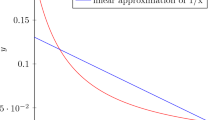Abstract
Homomorphic encryption (HE) has recently attracted considerable attention as a key solution for privacy-preserving machine learning because HE can apply to various areas that require to delegate outsourcing computations of user’s data. Nevertheless, its computational inefficiency still hinders its wider application. In this study, we propose an alternative to bridge the gap between the privacy and efficiency of HE by encrypting only a small amount of private information. We first derive an exact solution to HE-friendly ridge regression with multiple private variables, while linearly reducing the computational complexity of this algorithm over the number of variables. The proposed method has the advantage that it can be implemented using any HE scheme. Moreover, we propose an adversarial perturbation method that can prevent potential attacks on private variables, which have rarely been explored in HE-based machine learning studies. An extensive experiment on real-world benchmarking datasets supports the effectiveness of our method.











Similar content being viewed by others
References
Acharya MS, Armaan A, Antony AS (2019) A comparison of regression models for prediction of graduate admissions. In: 2019 International conference on computational intelligence in data science (ICCIDS). IEEE, pp 1–5
Aono Y, Hayashi T, Phong LT et al (2017) Input and output privacy-preserving linear regression. IEICE Trans Inf Syst 100(10):2339–2347
Brakerski Z, Gentry C, Vaikuntanathan V (2014) (Leveled) fully homomorphic encryption without bootstrapping. ACM Trans Comput Theory (TOCT) 6(3):1–36
Byun J, Lee W, Lee J (2021) Parameter-free he-friendly logistic regression. Adv Neural Inf Process Syst 34:8457–8468
Cai Z, He Z, Guan X et al (2016) Collective data-sanitization for preventing sensitive information inference attacks in social networks. IEEE Trans Dependable Secure Comput 15(4):577– 590
Cheon JH, Kim A, Kim M et al (2017) Homomorphic encryption for arithmetic of approximate numbers. In: International conference on the theory and application of cryptology and information security. Springer, pp 409–437
De Spiegeleer J, Madan DB, Reyners S et al (2018) Machine learning for quantitative finance: fast derivative pricing, hedging and fitting. Quantitative Finance 18(10):1635–1643
Dua D, Graff C (2017) UCI machine learning repository. http://archive.ics.uci.edu/ml
Feldman M, Friedler SA, Moeller J et al (2015) Certifying and removing disparate impact. In: Proceedings of the 21th ACM SIGKDD international conference on knowledge discovery and data mining, pp 259–268
Fredrikson M, Jha S, Ristenpart T (2015) Model inversion attacks that exploit confidence information and basic countermeasures. In: Proceedings of the 22nd ACM SIGSAC conference on computer and communications security, pp 1322–1333
Gai K, Qiu M, Zhao H (2017) Privacy-preserving data encryption strategy for big data in mobile cloud computing. IEEE Trans Big Data
Gentry C (2009) Fully homomorphic encryption using ideal lattices. In: Proceedings of the forty-first annual ACM symposium on theory of computing, pp 169–178
Gentry C, Halevi S, Smart NP (2012) Fully homomorphic encryption with polylog overhead. In: Annual international conference on the theory and applications of cryptographic techniques. Springer, pp 465–482
Guo L, Ying X, Wu X (2010) On attribute disclosure in randomization based privacy preserving data publishing. In: 2010 IEEE international conference on data mining workshops. IEEE, pp 466–473
Halevi S (2017) Homomorphic encryption. Tutorials on the foundations of cryptography. isc
Hardt M, Price E, Srebro N (2016) Equality of opportunity in supervised learning. In: Advances in neural information processing systems, pp 3315–3323
Janai J, Güney F, Behl A et al (2020) Computer vision for autonomous vehicles: problems, datasets and state of the art. Foundations and Trends®;, in Computer Graphics and Vision 12(1–3):1–308
Jia J, Gong NZ (2018) Attriguard: a practical defense against attribute inference attacks via adversarial machine learning. In: 27th {USENIX} security symposium ({USENIX} security 18), pp 513–529
Kaissis GA, Makowski MR, Rückert D et al (2020) Secure, privacy-preserving and federated machine learning in medical imaging. Nature Mach Intell:1–7
Kosinski M, Stillwell D, Graepel T (2013) Private traits and attributes are predictable from digital records of human behavior. Proc National Acad Sci 110(15):5802–5805
Lee W, Ko H, Byun J et al (2021) Fair clustering with fair correspondence distribution. Inf Sci 581:155–178
Liu Q, Shen H, Sang Y (2014) A privacy-preserving data publishing method for multiple numerical sensitive attributes via clustering and multi-sensitive bucketization. In: 2014 Sixth international symposium on parallel architectures, algorithms and programming. ieee, pp 220–223
Lou Q, Feng B, Fox GC et al (2019) Glyph: fast and accurately training deep neural networks on encrypted data. arXiv:191107101
Ma L, Sun B (2020) Machine learning and ai in marketing–connecting computing power to human insights. Int J Res Mark 37(3):481–504
Morshed T, Alhadidi D, Mohammed N (2018) Parallel linear regression on encrypted data. In: 2018 16th Annual conference on privacy, security and trust (PST). IEEE, pp 1–5
Park S, Byun J, Lee J et al (2020) He-friendly algorithm for privacy-preserving svm training. IEEE Access 8:57,414–57,425
Park S, Byun J, Lee J (2022) Privacy-preserving fair learning of support vector machine with homomorphic encryption. In: Proceedings of the ACM Web Conference 2022, pp 3572–3583
Poursaeed O, Katsman I, Gao B et al (2018) Generative adversarial perturbations. In: Proceedings of the IEEE conference on computer vision and pattern recognition, pp 4422–4431
Qiu G, Gui X, Zhao Y (2020) Privacy-preserving linear regression on distributed data by homomorphic encryption and data masking. IEEE Access 8:107,601–107,613
Sumathi M, Sangeetha S (2018) Enhanced elliptic curve cryptographic technique for protecting sensitive attributes in cloud storage. In: 2018 IEEE international conference on computational intelligence and computing research (ICCIC). IEEE, pp 1–5
Voigt P, Von Dem Bussche A (2017) The Eu General Data Protection Regulation (gdpr). A Practical Guide 1st Edn. Springer International Publishing, Cham
Acknowledgements
This work was supported by the National Research Foundation of Korea (NRF) grant funded by the Korean government (MSIT) (NRF-2019R1A2C2002358) and in part by Institute of Information & communications Technology Planning & Evaluation (IITP) Grant funded by the Korean Government (MSIT) (No. 2022-0-00984).
Author information
Authors and Affiliations
Corresponding author
Additional information
Publisher’s note
Springer Nature remains neutral with regard to jurisdictional claims in published maps and institutional affiliations.
Rights and permissions
Springer Nature or its licensor holds exclusive rights to this article under a publishing agreement with the author(s) or other rightsholder(s); author self-archiving of the accepted manuscript version of this article is solely governed by the terms of such publishing agreement and applicable law.
About this article
Cite this article
Byun, J., Park, S., Choi, Y. et al. Efficient homomorphic encryption framework for privacy-preserving regression. Appl Intell 53, 10114–10129 (2023). https://doi.org/10.1007/s10489-022-04015-z
Accepted:
Published:
Issue Date:
DOI: https://doi.org/10.1007/s10489-022-04015-z




